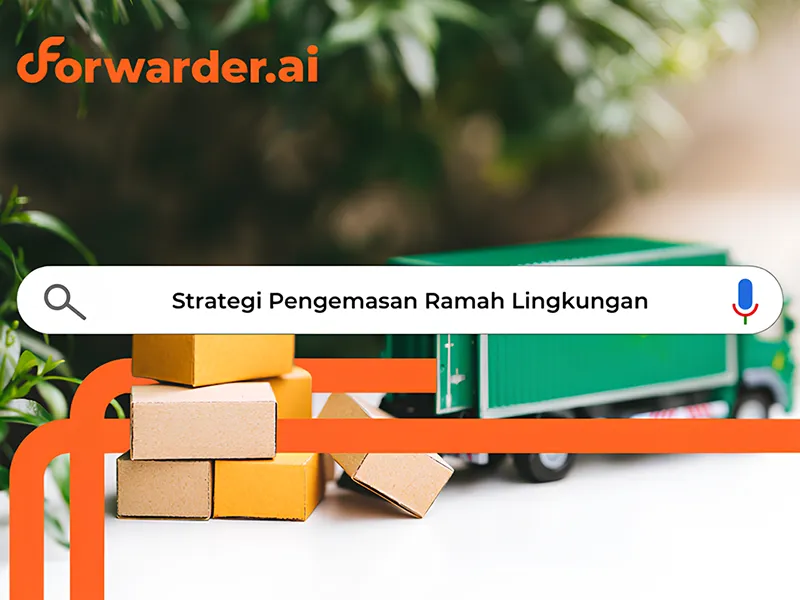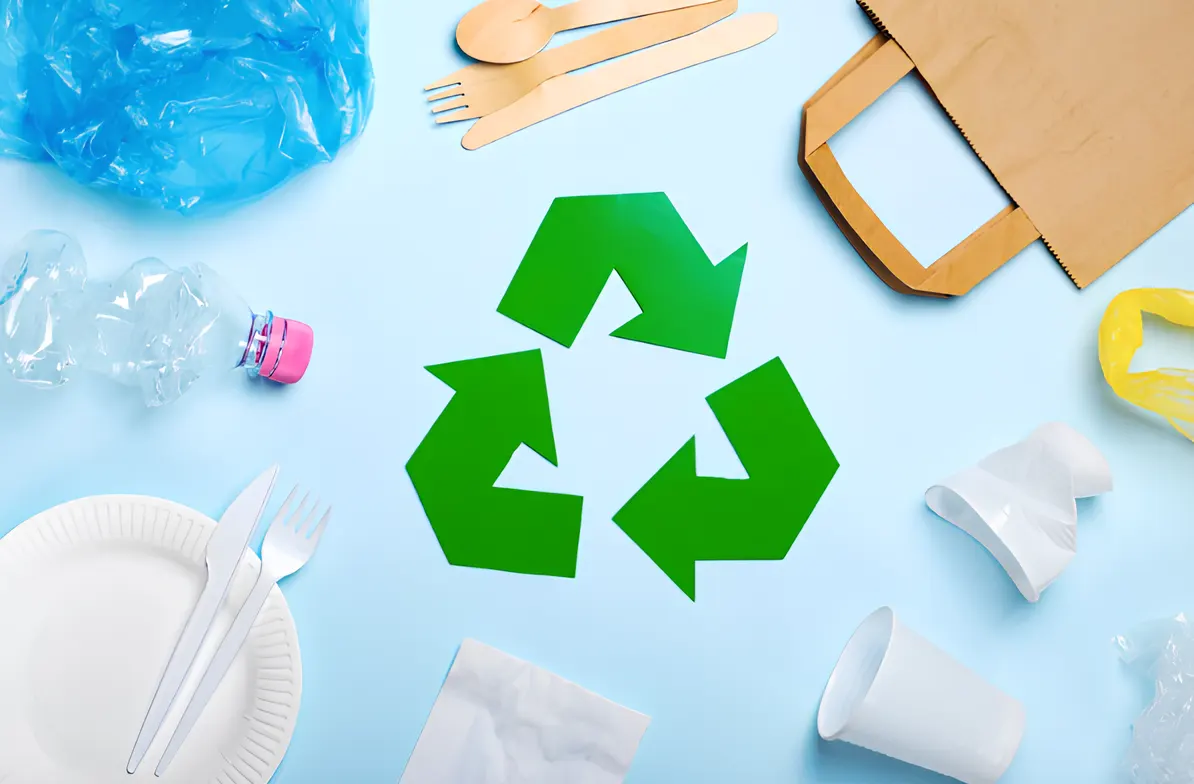
Using sustainable packaging materials to improve sustainability and reduce environmental impact.
In the era of globalization, awareness of the importance of environmental sustainability continues to rise, demanding the logistics industry to play an active role in adopting eco-friendly packaging strategies. The globalization of increasingly complex supply chains makes the need for efficient and environmentally responsible packaging solutions even more pressing.
Green packaging is important to preserve the environment and to meet the demands of consumers who are increasingly aware of environmental issues. Modern consumers prefer products and services that support sustainability, so logistics companies must be able to adapt to this trend to remain relevant and competitive.

Recycled materials.
In addition to meeting consumer demands, eco-friendly packaging also contributes to the reduction of carbon footprint and conservation of natural resources. By adopting recyclable and biodegradable materials, and optimizing packaging design to minimize waste, the logistics industry can play a significant role in creating a greener and more sustainable future.
Green logistics encompasses a wide range of practices that aim to reduce negative impacts on the environment. One important step is the use of biodegradable and recyclable packaging materials. Materials such as:
By taking such efforts, one can significantly reduce their logistics carbon footprint.
In addition to the use of environmentally friendly packaging materials, packaging design optimization also plays a key role in green logistics. Efficient design, which uses the minimum possible materials and eliminates excess packaging, can reduce waste and improve transportation efficiency. The use of advanced technology in packaging design can also help minimize empty space in packaging, thereby enabling the delivery of more goods in a single shipment and reducing the number of trips required.
By adopting these practices, logistics companies can contribute significantly to environmental sustainability. In addition, the implementation of green logistics can also improve the company's image in the eyes of consumers who are increasingly aware of environmental issues, as well as meet increasingly stringent environmental regulations. The implementation of green logistics not only brings benefits to the environment, but also to operational efficiency and company reputation.
Adopting an eco-friendly packaging strategy offers various benefits to logistics companies. First, reduced waste and more efficient use of materials can reduce operational costs. Secondly, companies that implement green practices can enhance their brand reputation, attract consumers who are concerned about environmental issues, and meet increasingly stringent regulatory requirements regarding sustainability.
For example, in the cosmetics sector, there are brands like The Body Shop that have adopted eco-friendly concepts, offering products certified as free from animal testing and creating environmentally friendly packaging. The presence of brands or companies that implement green marketing strategies provides differentiation from other companies, thus enhancing competitive advantage (Porter (1985) in Crassous & Gassmann, 2012). According to the Statista report Natural Cosmetics: Indonesia in Fakhrunissa et al. (2020), the eco-friendly beauty industry in Indonesia is projected to grow annually by 7.2% during the period of 2019-2023.
Read more : Up to 20% Efficiency Through Green Logistics
However, the implementation of green packaging also faces several challenges. One of them is the initial cost which may be higher for green packaging materials compared to conventional materials. Also, companies have to invest in research and development to create innovative and efficient packaging solutions. Another challenge is finding suppliers who can provide green materials in large quantities and with consistent quality.
Nonetheless, with the growing demand for sustainable products and services, investing in green packaging can provide long-term benefits for companies. Sustainability not only improves operational efficiency but also strengthens relationships with consumers who are increasingly concerned about environmental impacts. By constantly innovating and adapting, logistics companies can overcome these challenges and remain competitive in an increasingly environmentally conscious market.
Technology and innovation are key factors in the development of green packaging. Internet of Things (IoT) technology can be used to monitor and optimize the use of packaging materials in the supply chain. IoT sensors can provide real-time data on the condition and amount of packaging materials, allowing companies to make more informed decisions and reduce waste. Thus, operational efficiency can be improved and costs can be reduced.

Environmentally friendly packaging.
In addition, blockchain can be used to ensure the transparency and authenticity of the packaging materials used. By utilizing this technology, companies can trace the origin and lifecycle of packaging materials, ensuring that the materials used comply with sustainability standards. This also helps build consumer trust, as they can see tangible proof that the company is committed to environmentally-friendly practices.
The use of advanced technologies such as IoT and blockchain in green packaging not only improves efficiency and transparency, but also encourages further innovation in the logistics industry. By continuously innovating, companies can find new, better and greener solutions, which in turn will help reduce negative environmental impacts and support long-term sustainability.
The future of green logistics will bring new standards to the logistics industry. Governments in various countries are increasingly tightening environmental regulations, encouraging companies to adopt more sustainable practices. In addition, consumers who are increasingly concerned about environmental issues will continue to drive demand for environmentally friendly products and services. Global awareness of the importance of sustainability makes eco-friendly packaging an inevitable necessity.
To remain competitive, logistics companies must continue to innovate and adopt new technologies that support sustainability. The use of recyclable and biodegradable packaging materials, optimization of packaging design, and utilization of advanced technologies will be the keys to success in creating a more efficient and environmentally friendly logistics system. Innovations in this area will not only meet regulatory and consumer demands, but will also provide operational benefits for companies.
Read more : Green Logistics: Digital Freight Forwarder Leading the Way
The future of green logistics will be heavily influenced by companies' ability to adapt to these changes. Companies that are proactive in adopting green technologies and practices will be able to reduce negative environmental impacts while improving their efficiency and competitiveness. By continuing to commit to sustainability, the logistics industry can play an important role in protecting the environment and ensuring long-term sustainability.
forwarder.ai presents forsis (Forwarder Scalable Intelligence System), an AI-powered transportation management system that simplifies your operations from booking to vehicle control, all within one platform. Additionally, there is fordex (Forwarder Data Exchange), which integrates forwarder.ai's API into your system to facilitate the shipping of any goods. With this, we aim to reduce environmental impact, enhance efficiency, and meet the growing demands of consumers and regulations. Investing in technology and innovation will be key factors in creating a more sustainable and competitive future for logistics.
forwarder.ai is committed to continue revolutionizing the logistics industry through innovative technology-based solutions. Our mission is to provide efficient, transparent, and scalable logistics services that meet the dynamic needs of businesses across Indonesia. With a focus on regional expertise, we specialize in land and sea shipping services, ensuring customer shipments arrive safely and on time.
Nikmati voucher hingga 200K untuk pengiriman pertamamu. Langsung berlaku dan otomatis terpotong saat checkout.
Dapatkan Diskon!